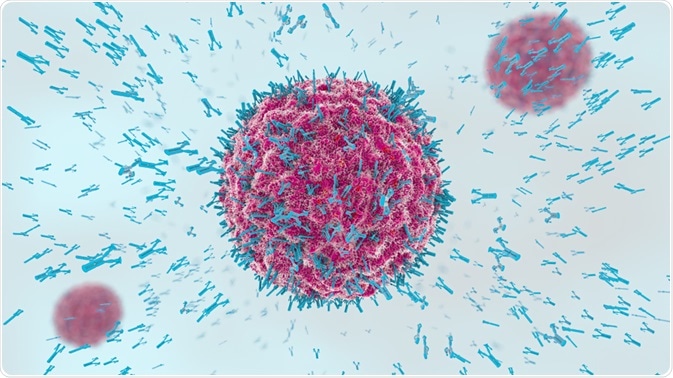Antibodies are proteins that are essential to the immune system and produced by the B-cells to contribute to the destruction of pathogens in the system.

Image Credit: Christoph Burgstedt/Shutterstock.com
Antibodies bind to specific molecules called antigens on non-autologous cells (non-self-cells). Within basic and clinical science this recognition of specific antigens has been manipulated for use within research and clinical therapies.
The rise of monoclonal antibody research
Antibodies can be used in research, specifically monoclonal antibodies. Monoclonal antibodies are descendent antibodies of a parent immune cell, meaning that they are all identical to the parent cell and each other. Therapies can manipulate this property so that the antibodies only target a specific type of cell or antigen.
The use of monoclonal antibodies has rapidly grown within therapeutics. Today, monoclonal antibodies are used in a wide range of treatments such as; for autoimmune disorders, cardiovascular disease, infectious diseases, cancer, inflammatory disorders, and others.
Monoclonal antibodies are essential in research, as a part of a variety of techniques such as; immunocytochemistry, western blotting, enzyme-linked immunosorbent assays and flow cytometry.
The rapidly rising popularity of the use of monoclonal antibodies has led to its market value growing to a staggering $85.4 billion in 2015, with predictions for it to grow to $138.6 billion by 2024.
The use of monoclonal antibodies has expanded understanding of a range of diseases and contributed to the development of new immunotherapy treatments.
Cancer therapies have benefited from research with monoclonal antibodies, most notably resulting in the development of Rituximab, an effective treatment for many cancers. Many monoclonal antibodies are now recognized by the US Food and Drug Administration (FDA) as safe for use in commercial therapeutics, and the number increases every year.
However, while antibody research has seen much success and popularity, it is not without its limitations. There are issues surrounding cost, tissue accessibility, inadequate pharmacokinetics and unpredictability surrounding modes of action. These drawbacks act as a major barrier to the more widespread therapeutic use of antibodies.
Cost of monoclonal antibodies
Advanced equipment is required for the large-scale production of monoclonal antibodies that encompass multiple disulfide bonds and post-translational modifications, and this equipment is expensive.
Clinical efficacy is usually only achieved via injecting large amounts of the monoclonal antibodies into the system, meaning that large quantities are required to be produced for each treatment, thus increasing the cost. Researchers are attempting to lower the cost by investigating alternative methods of production, using microorganisms and plants.
These techniques may increase accessibility of monoclonal antibody therapies by reducing costs.
Tissue penetration in monoclonal antibody therapies
Studies have shown that in some cases monoclonal antibody treatments, particularly those intended to treat tumors, can mostly remain in the bloodstream rather than interacting with the target cells.
Antibodies are large molecules that have a long half-life and are prevented from being eliminated by the kidney glomeruli which severely impairs their suitability for use in cancer treatment if there are negative impacts in the kidney.
Scientists are investigating the pharmacokinetics with retention in the targeted tissue, efficient penetration, and multiple antibody characteristics.
Mode of action of monoclonal antibodies
The mechanisms of how monoclonal antibodies impact the body are complex and are not always consistent between in vitro and in vivo, adding a level of risk to the human trials designed to test new monoclonal antibody treatments.
Monoclonal antibodies may bind to the corresponding antigen, initiating a biological response, or, they may target a receptor on a cell’s surface, preventing its interactions and activities.
Ethical issues with monoclonal antibodies
There are ethical issues surrounding the use of monoclonal antibodies in research, as there is disagreement with the dependence on animals to produce the antibodies.
New monoclonal antibody treatments are often tested on animals before they are tested on humans. Without the use of animals in research the knowledge obtained, and clinical treatments would not be possible. However, practices such as sharing of data aim to reduce dependency on animal testing.
Furthermore, ths use of in vitro and in silico technologies such as cell lines, modeling, and systemic pharmacology for safety and toxicology testing is increasing. As well as the ethical benefits of these methods, they often provide results which are more directly applicable to humans.
Overcoming barriers allowing for the development of new treatments
Overcoming limitations is vital to improving the success of antibody use. There is further potential and removing barriers surrounding antibody therapies and research will advance knowledge within basic and clinical science, developing further immunotherapies.
References:
- Bordeaux, J., Welsh, A. W., Agarwal, S., Killiam, E., Baquero, M. T., Hanna, J. A., ... & Rimm, D. L. (2010). Antibody validation. Biotechniques, 48(3), 197-209.
- Chames, P., Van Regenmortel, M., Weiss, E., & Baty, D. (2009). Therapeutic antibodies: successes, limitations, and hopes for the future. British journal of pharmacology, 157(2), 220-233.
- Grand View Research. “Monoclonal Antibodies (mAbs) Market Size, Industry Report, 2013 – 2024.” Report ID: GVR-1-68038-280-8 (2016)
- Yang, O., Prabhu, S., & Ierapetritou, M. (2019). Comparison between batch and continuous monoclonal antibody production and economic analysis. Industrial & Engineering Chemistry Research, 58(15), 5851-5863.
Further Reading
Last Updated: Nov 4, 2024